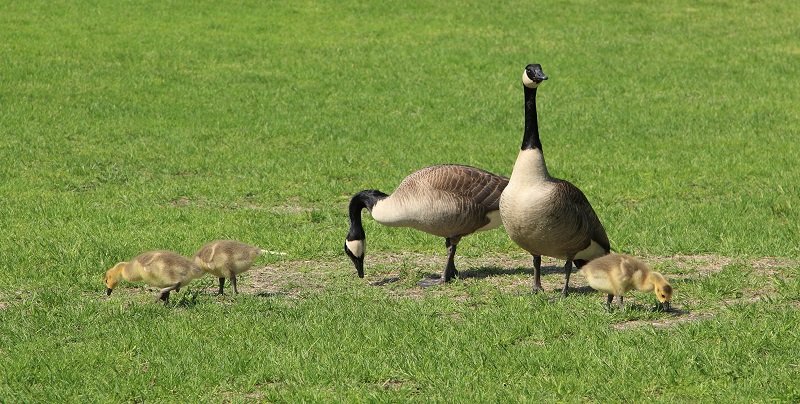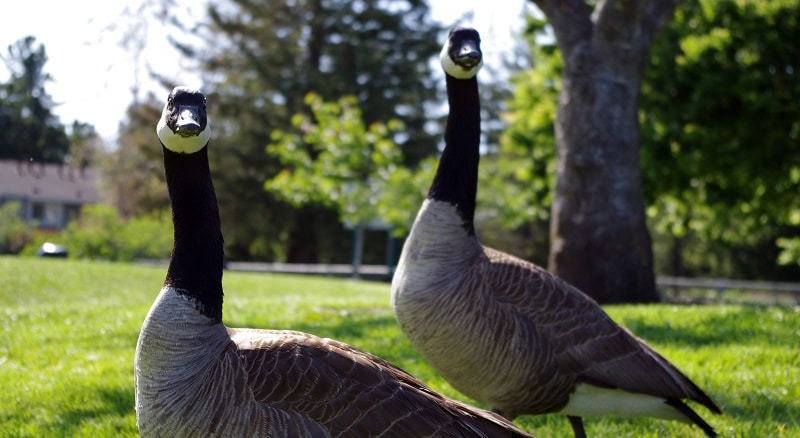Depending on where you live, you might be visited by geese as they either fly south for the winter or north for the summer. As the geese migrate, they are always on the lookout for a new home, including your backyard. Now, this might sound nice, but in practice, geese are pretty destructive animals, and it’s best to get them to move on or prevent them from landing in the first place. So, let’s take a look at several options for dealing with unwanted migrating geese.

How to Keep Geese Off the Lawn (The Short Answer)
The are two approaches when dealing with geese. The first is to make your yard uninviting for geese landing, and the second is to make your yard uncomfortable for geese to hang around. Here are six ideas to keep geese off your lawn.
- Rope or Wire Fencing
- Plant a “Wall” of Vegetation
- Decoys
- Get a Dog
- Make Noise
- Chemical Repellents
How to Keep Geese Off the Lawn (The Options)
Anyone that is lucky enough to have a nice lush lawn that backs onto a lake ought to be the envy of most other homeowners. The rest of us can only imagine the joy one must experience spending sun-filled summer afternoons stretched out on the lawn with a book and your favorite ice-cold beverage, with the sound of the water and birds in the background. Unless those birds are geese, that is. If geese take a liking to your lawn, this picture-perfect scenario can quickly become a living nightmare, and you’ll be anything but relaxed. In fact, the only thing you will probably care about any more is finding out how to keep geese off the lawn! It becomes your mission in life.
Geese On Your Lawn? Here’s Our Best Tip for You
The first thing to make you aware of here is that you’re not doomed to spend the next 20-something years with your noisy neighbors (yes, they really can live that long!). There are lots of different things you can do to encourage geese to go elsewhere and leave you in peace.
The two tips below are our favorites and what we believe to be the most effective.
- Rope or Wire Fencing – When geese are looking for the perfect nesting ground, they look for a body of water that has a clear path onto an open area of nicely mowed grass (gives them greater visibility to see what’s coming), with planted areas that offer hiding and sleeping spots. These conditions make them feel safe from predators, as they have quick access to the water. So what you need to do is block this easy access to the water, and the cheapest way to do so is usually installing a rope or wire barrier fence, or a mesh fence. In either case, the fence doesn’t need to be that high to have to desire effect. If you opt for a barrier fence, it should have at least two lines. One lower down at around 5-6 inches, and another at 16-18 inches in height. This will ensure that the geese can neither duck under the fence, nor jump over it, and will play into their fear of being trapped on land if a predator approaches, and this is where they are most vulnerable. This fear can be enough to make them move on.
- Plant a “Wall” of Vegetation – You can use vegetation to pretty much achieve the same thing, and if done properly it can be easier on the eye too and fit in with the rest of your landscaping. Simply plant a buffer of vegetation that blocks the path (and their view) to the water’s edge, and you’ll make any flock of geese uneasy about nesting in your yard. More expensive than the first option though, and more maintenance required.
Other Things You Can Try to Get Geese to Leave Your Lawn
- Decoys – One of the easier methods you can try to warn off geese is to buy some predator decoys and position them around your lawn. These do work better before the geese have made your lawn their home, but can still be effective after that point if you are proactive and change the position of the decoys frequently. Effectiveness can also be increased by combining these decoys with noise deterrents. Swan, alligator and coyote decoys are all popular options, but as a standalone solution decoys are rarely effective in the long term if not combined with other methods, as geese are clever and quickly get used to imitation devices.
- Get a Dog – If decoys don’t work, then you could try something more life-like. While dogs aren’t natural “predators” of geese, they are very territorial and don’t take kindly to intruders entering their space, which can make geese feel unsettled. If the dog confronts the geese on numerous occasions throughout the day, the disruption it causes is likely to make the geese think about moving on. If an option, trained geese-herding dogs should be used, as untrained dogs may just cause the geese to seek refuge in the water, where they may come to realize that the dog is not a threat after all. Trained dogs are more likely to be able to get the geese to take flight, which increases the likelihood of them abandoning your lawn and leaving you in peace!
- Noise – Some predator decoys come with matching predator-like sounds, but other loud, sudden noises can also be used to scare off geese and reclaim your lawn. The trick here, as with the decoys, is to avoid using the exact same sound all the time or playing the sound at regular intervals. Geese will get wise to this, and it will no longer startle or scare them off. Air horns and the sounds of machinery have been known to have scared them, but when used alone this outcome is usually temporary. For that reason, we would strongly recommend using some of the other methods above too.
- Chemical Repellents – This is another option available to you, but can be rather labor-intensive and get quite expensive, particularly if your lawn is of a considerable size as the entire area needs to be sprayed. Some repellents will affect the taste of the grass, while others make the grass harder for the geese to digest. These repellents do not harm the geese in any way, but can signal that there’s no reliable food source in the area, which can be a significant enough reason for them to search for a new nesting ground.

A Few More Things You Should Know
We wanted to get straight to the point with this article, and that’s why we got right into the thick of it and talked through a few of the best options available to you to keep geese off your lawn. But there are a few other key pieces of information that may help you.
- Prevention is Easier than Getting Rid – Timing is everything here. If the geese have already built their nests in and around your lawn, you’ll have a much harder time getting them to leave. It depends where you are in the country, but nests are typically built somewhere between March and April, and once they’re built both males and females will defend them as though their lives depend upon it.
- NEVER Feed Them – The last thing you want to do is make any geese feel like your property offers a reliable source of (FREE) food, as that’s an invitation they aren’t likely to pass up. This may sound obvious, but humans have somewhat of an obsession with feeding wildlife, even when they’re told not to. And while you might think you’re being “a good person” and that “it’s just this one time,” the geese most certainly won’t be thinking that. They’ll stick around for more!
Why Geese on Your Lawn is a Problem
“How cuteeeee” said no one ever about geese. As much as we might encourage some types of bird to frequent our yards with feeders and baths, no one wants a flock of geese to make their yard their “home from home.” They can create LOTS of problems for both you and your lawn. So if you need reminding why you don’t want a flock of resident geese at your property, here are a few reasons…
- Very Noisy – It won’t be long before you’re dreaming of total silence with all of that honking! Geese can be VERY loud.
- They Overgraze – Canadian geese will completely abuse your lawn, eating the grass and overgraze, often causing soil erosion and creating bald patches. You’ll constantly be reseeding or returfing to try and get your lawn looking anything near decent again, which gets expensive.
- They’re Aggressive – These are not cute little creatures; they can be quite scary. They’re known to be aggressive to humans if they feel the need to be.
- Create Lots of Waste – If they gave prizes out for producers of bodily waste, geese would be right up there in contention. Their droppings are large, messy and absolutely stink.


Leave a Reply